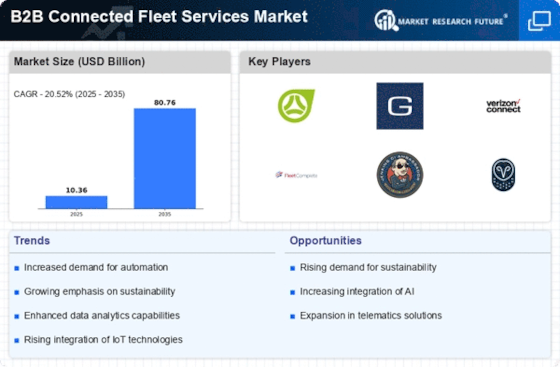Market Analysis
In-depth Analysis of B2B Connected Fleet Services Market Industry Landscape
Over the past few decades, Artificial Intelligence (AI) and the Internet of Things (IoT) have brought about transformative changes in various industries. Fleet management, in particular, has experienced significant advancements through automation and new technologies, resulting in the emergence of connected, efficient, and safer vehicles. The integration of these innovations into fleet management offers numerous benefits, including enhanced safety measures, financial savings, and improved compliance.
Telematics, as an IoT application tailored for vehicles, plays a pivotal role in intelligent fleet management solutions. This tool empowers fleet managers to monitor and reroute vehicles around the clock, leading to more effective scheduling, faster and secure routing, and overall cost reduction. Additionally, the adoption of IoT contributes to cost savings in fleet maintenance and vehicle lifecycle management. Fleet managers can track vehicle downtime caused by breakdowns, towing, and emergency repairs, allowing them to shape optimal maintenance schedules for improved efficiency.
The rise of online shopping malls and e-commerce websites has significantly impacted the transportation industry, with the IoT playing a crucial role in furthering developments in this sector. Fleet managers can leverage technologies like GPS and RFID in the cloud to automate delivery times, ensuring efficient dispatch of goods or parcels and maintaining an optimal number of vehicles on the road. The integration of AI-powered fleet management software enables predictions based on direct equipment measurements and contextual data, encompassing factors such as weather, traffic, road quality, and driver behavior. This predictive capability enhances decision-making for fleet managers.
Machine Learning (ML) is instrumental in identifying failure scenarios by analyzing data collected from individual vehicle parts and operating conditions. ML's ability to interpret new datasets accurately, even without explicit programming, contributes to more effective and proactive maintenance strategies. Additionally, the deployment of AI dash cams enables fleet managers to monitor drivers closely, identifying and addressing bad driving habits promptly. Real-time incidents captured by these AI dash cams provide valuable training opportunities to enhance driver safety.
The rapid developments in connected fleet services play a crucial role in driving the Business-to-Business (B2B) connected fleet services market. The integration of AI, IoT, and ML technologies in fleet management not only improves operational efficiency but also enhances safety, compliance, and overall performance. Fleet managers, armed with these advanced tools, are better equipped to navigate the complexities of the transportation landscape, ensuring a seamless and optimized fleet management experience.


















Leave a Comment